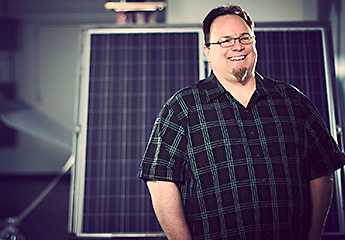
Chad Byron is a renewable energy graduate of Truckee Meadows Community College.
State-of-the-art curriculum developed by national experts, together with a growing need for technicians trained in renewable energy, are powering the growth of a robust solar technology program at Truckee Meadows Community College.
“Students are involved in becoming the researchers and engineers of tomorrow as technologies are developing,” said Scott Walker, Energy Technologies instructor at TMCC.
An outdoor training facility is being constructed at TMCC’s Health Science Center at Redfield as part of the Rocky Mountain Solar Training Program grant’s third year allocation. Grant funds are provided by the U.S. Department of Energy.
“TMCC’s new outdoor lab will be designed to give students a more hands-on installation and troubleshooting training experience,” Walker said.
Solar energy programs at TMCC are:
- Energy Technologies Degree - Associate of Applied Science, Solar Energy Emphasis
- Solar Energy Technician Skills Certificate
Graduates of these programs work with solar energy systems on three levels: residential, commercial and at the utilities scale.
Most of the expansion in solar applications in the state have been with utility scale solar power plants, government buildings such as Washoe County School District and the Nevada National Guard, and non-profit organizations such as the SPCA of Northern Nevada.
“In Nevada, we’re rapidly building utility scale installations and they will need technicians to run these plants,” Walker said. “The Western United States has excellent solar resources, with minimal power production interference due to clouds and inclement weather.”
Nevada Is a Good Environment for Solar Power Generation
Both solar energy production plants and geothermal facilities that are powered in part by solar are being constructed in Nevada at an accelerated pace.
Geothermal plants using solar panels to help run operational equipment are known as hybrid facilities. Solar technology improves the efficiency of geothermal plants by providing energy for uses such as lighting. Stillwater Geothermal Plant is one of the first hybrid geothermal plants, Walker said.
Nevada offers partial sales and use tax, and partial property tax abatements to renewable energy companies that employ 50 percent Nevada workers and pay a specified wage baseline. The Governor’s Office of Energy oversees these programs.
“Nevada is ranked number two in solar electricity capacity per capita,” according to the Governor’s Office of Energy State of Nevada 2015 Status of Energy report.
“We’ve got a lot of construction right now in Nevada – solar is growing – and solar support of geothermal plants is also a part of the mix,” Walker said. “There is highest demand for solar installations in large metropolitan areas; places where electrical power is expensive.”
A large local company that installs solar panels is Hamilton Solar. The Nevada firm provides consultation, design and installation of solar systems for residential and commercial clients. Two of their recent projects include installations at Desert Research Institute and Desert Willow Treatment Center in Las Vegas, according to Hamilton Solar’s website.
Black Rock Solar, based in Nevada and California, has installed solar panels on the roofs of the Sierra and Vista Buildings at TMCC. Students, staff and the public can link to the monitoring program of solar panels, view the amount of energy being produced and compare kW generated with the equivalents of energy produced by wood or petroleum.
Curriculum Is Designed by National Experts
The Solar Instructor Training Network (SITN) is a program of the U.S. Department of Energy. It is subdivided into nine training hubs that partner with community colleges in each regional hub. TMCC is part of the Rocky Mountain Partnership.
“Solar Energy International, or SEI, curriculum is excellent because it was designed by people that do solar installations continually, people who live and breathe solar,” Walker said. “They teach it all over the world.”
The SEI courseware is taught in-person at TMCC, with students learning design, operation and maintenance of solar photovoltaic arrays, also called PV systems.
“All of the solar instructors at TMCC have been trained in the SEI coursework,” Walker said.
SITN envisions superior standardization of solar energy practices.
“The goals of Solar Instructor Training are to accelerate market adoption of solar technologies by ensuring that high-quality installations are standard and to create sustainable jobs within the solar installation industry,” according to the Solar Instructor Training Network website.
Curriculum at TMCC also meets guidelines of the North American Board of Certified Energy Practitioners (NABCEP).
“Our program materials are aligned with standards of the NABCEP, an independent group that has created the standards for workers in renewable energy,” Walker said.
For more information about Energy Technologies programs, including the associate degree and skills certificate, please call 775-856-5300.






